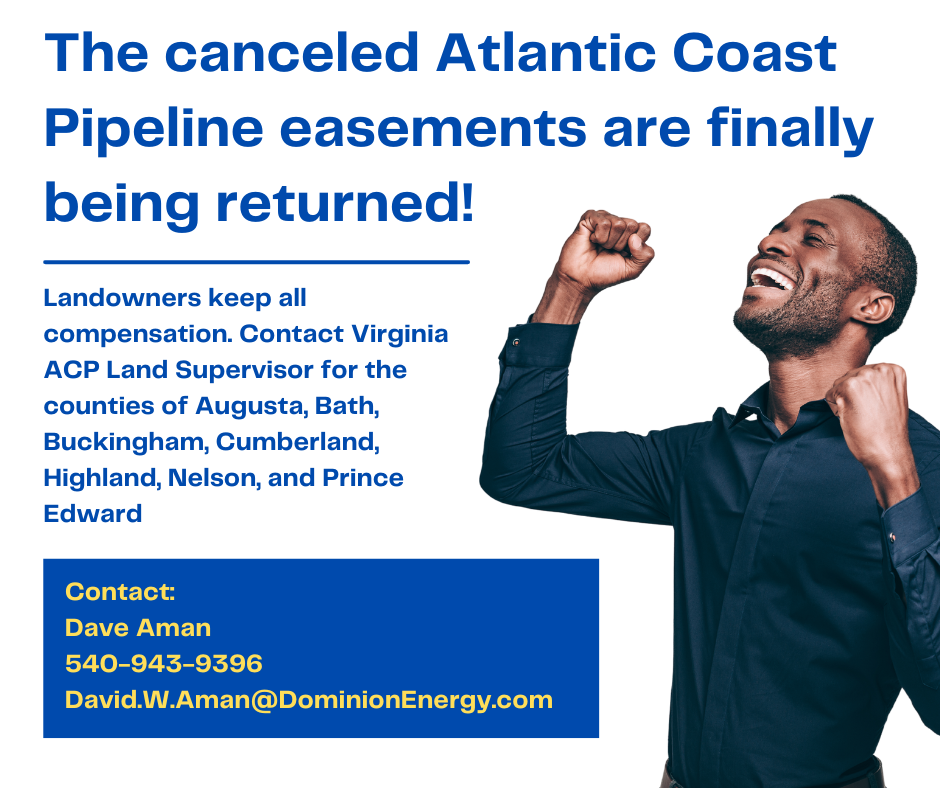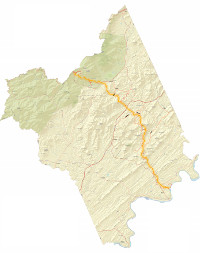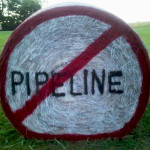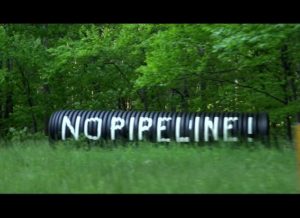
by Mary Eiserman | Jan 4, 2023 | Dominion, Easement Agreements, Eminent Domain, Friends of Nelson
Happy new year! We are pleased to share with you this article in the Nelson County Times recently about the return of landowner easements on the canceled Atlantic Coast Pipeline.
Dominion Energy has agreed to return all easements to landowners. Landowners will keep all compensation.
For two and a half years the Niskanen Center, along with Joyce Burton (landowner liaison for Friends of Nelson) helped to turn this tide. This effort included a year-long partnership with Senator Tim Kaine’s office.
If you are a landowner on the canceled ACP route and want an expedited release (for example if you have plans for the property or you want to sell) please see the link below to contact the land agent in your area.
Virginia ACP Land Supervisor counties of Augusta, Bath, Buckingham, Cumberland, Highland, Nelson, and Prince Edward contact:
Dave Aman
540-943-9396
David.W.Aman@DominionEnergy.com
Please note that your land agent may be different than the one you initially worked with. For all counties on the ACP route see the link here for your land agent.
https://atlanticcoastpipeline.com/resources/docs/landowners/acp.fs.landownercontactinfo_july2020_v2%20(004).pdf
Together we are stronger!
by Mary Eiserman | Dec 1, 2022 | Dominion, Easement Agreements
As the holiday season is upon us, we are pleased to share some good news with our community!
The ACP easement release situation has changed dramatically since Aaron Ruby’s January 2021 statement to the Associated Press that ACP did “not intend to voluntarily release the easements.”
Despite FERC’s refusal to hold ACP’s feet to the fire on the easement/land use issue, in Nelson and Augusta courthouses, we are now seeing easement releases being filed for the individual landowners that participated in a year-long, focused advocacy initiative that included invaluable intercession by Senator Kaine’s office.
Even better, it looks like ACP may FINALLY be committing to what we have been asking for all along: release ALL of the easements! The ACP website now states “For properties that do not require any restoration work, we are developing a plan to coordinate with landowners to release their easements.”
Although ACP is STILL not offering landowners with undamaged properties specific “how to” instructions to follow in order to get released — except to “keep waiting” — this statement is better than what their site had posted in early November. It is our hope that a turnkey process will follow quickly.
But our work is not over yet. Now we need to ensure ACP actually lives up to this commitment. We will continue to work to find ways to get the word out to landowners so that they will know release is finally happening and can follow up with ACP as appropriate. (As we all know, ACP does not have a good track record re diligent follow-up when it is only the landowners who stand to gain from that effort.)
Please feel free to spread the word through your networks!
Together we are stronger,
FoN







